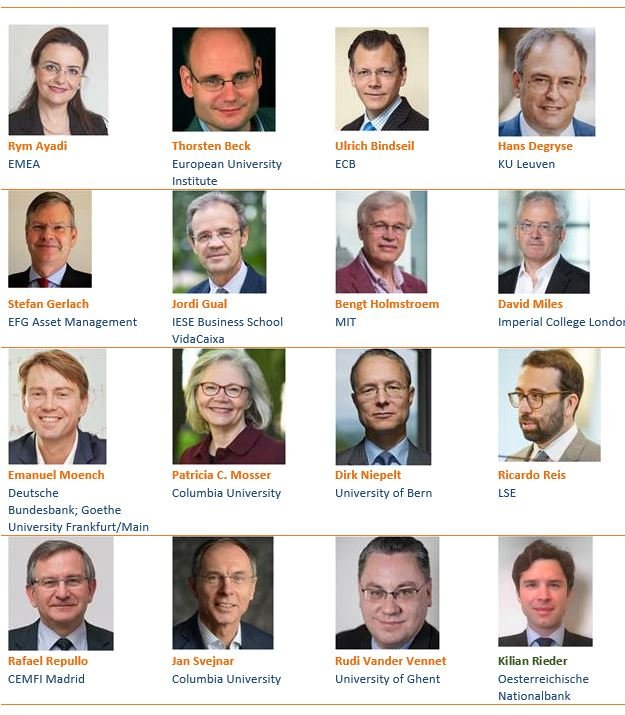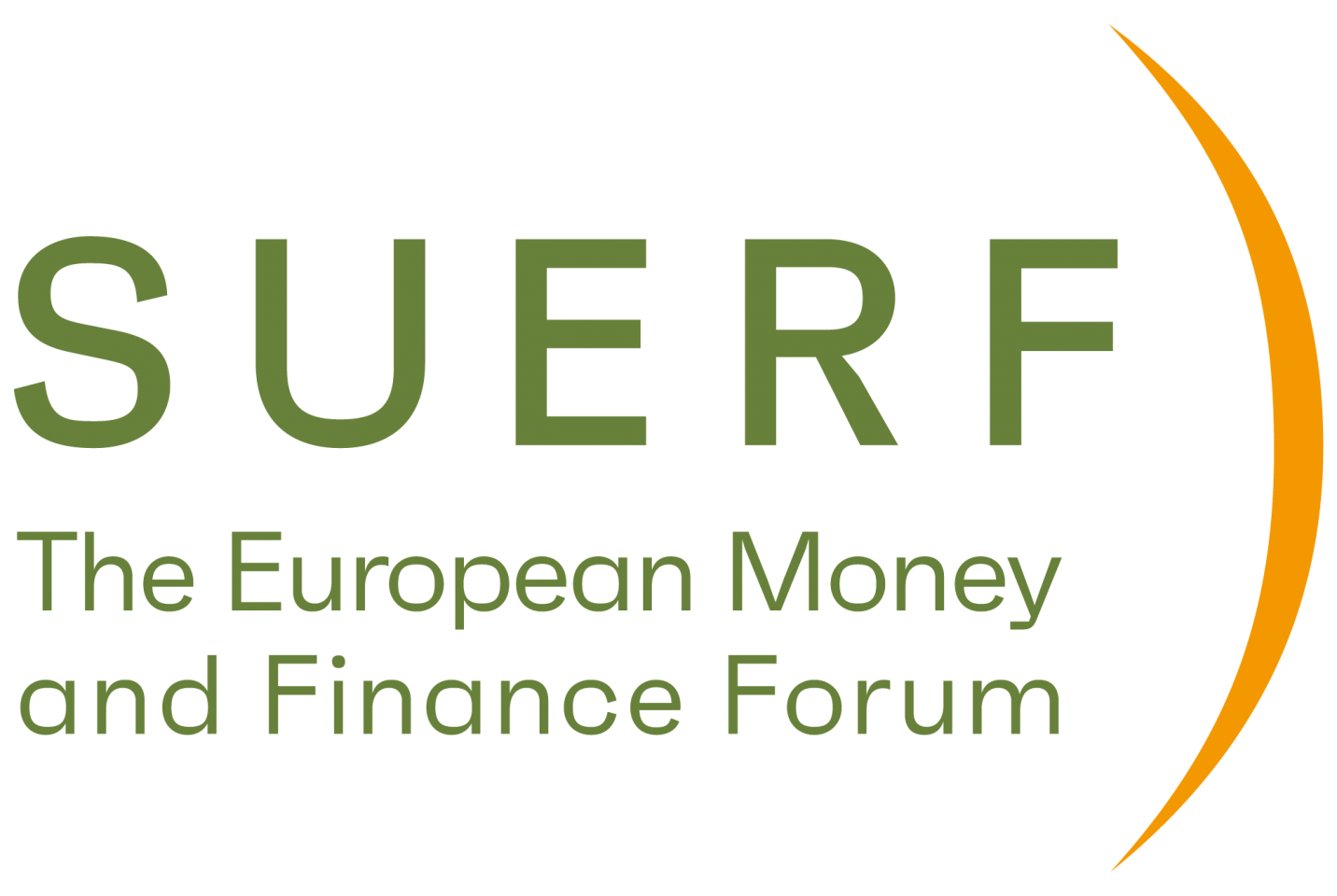1969-1974: Breakdown of the Bretton Woods International Monetary System
Colloquia
1969 C1 The Future of the International Monetary System
1970 C2 Monetary Policy and New Developments in Banking
1972 C3 Aspects of European Monetary Union
1973 C4 Financial and Monetary Aspects of Developing Multinational Enterprises
1974 C5 Floating Exchange Rates – What is to be learnt from Recent Experience
Publications
1969
Building the Financial System of a Developing Country, by J.S.G. Wilson
1970
European Monetary Integration. A United Kingdom Appraisal, by Peter Coffey and John R. Presley
The long term future of interest rates in a high consumption economy, by J.S.G. Wilson
Present Interrelationships Between Money and Foreign Exchange Markets, by Dr. Warren D. McClam
1971
Les Marchés Monétaires de Londres, by J.S.G. Wilson
The Nature and Uses of Bank Liquidity, by J. E. Wadsworth
Monnaie, Liquidité et Tauxd Intérêt, by L.A. Roj
Money, Liquidity and Interest Rates, by L.A. Roj
Marché de Eur-devises et PolitíqueNationale du Crédit, by F. E. Aschinger
The Euro-currency Market and National Credit Policy, by F. E. Aschinger
1972
Intégration Monétaire Régionale, by F. Boyer
The Theory and Policy of Optimum Currency Areas and their Implications for the European Monetary Union, by FabrizioOmida
The Role of Sterling after Britain&rsqu;s entry intthe European Community – a continental view, by H. Weise
L’avenir des Centres Financiers dans l’Union Monétaire Européenne, by A. Leeman
Monetary and Exchange Rate Policy of the EEC Countries, by FrancescMasera
The Role of Sterling after Britain&rsqu;s entry intthe EEC – a British view, by F. Cassell
The Future of Financial Centres in a European Monetary Union, by J.E. Nash
Discours d’Ouverture du Colloque “Aspects de l’Unifacation Monétaire Européenne”, by Louis Camu
Final Report of the Colloquium &ldqu;Aspects of European Monetary Union&rdqu;, by Paul Bareau
Emerging patterns of financial management in multinational companies, by Sylvain Plasschaert
L`evolution du systemebancaire Francais 1960-1970, by Henri Fournier
Struktur des Bankensystems und Geldpolitik, by Prof. Hans E. Büschgen
Die Rolle des Pfund Sterling in der Europäischen Wirtschaftsgemeinschaft: in Kontinentaler Sicht, by Herbert Weise
1973
Post-war Trends in East European Banking, by F. Pindak
La Revision des Droits de Tirage au Fonds Monétaire International, by Robert Mossé
A Theoretical Model of Bank Behaviour and its Implications for Monetary Policy, by MariMonti
A United Stock Exchange – The Road Ahead, by W.A. Thomas
Banks and Payments by Households, by W. Eizenga
The Stabilisation Policy of the International Monetary Fund – with particular emphasis on Latin America, by H. Haumer
1974-1979: Oil Shocks and Bank Failures
Colloquia
1976 C6 The Development of Financial Institutions in Europe
1977 C7 New Approaches in Monetary Policy
1979 C8 Europe and the Dollar in the World-Wide Disequilibrium
Publications
1974
- The Swiss Banks in the International Monetary Turmoil, by F. Aschinger
- Debt Management in the EEC, by P.K. Woolley and J.H. Coates
- Critical Examination of the Forward Exchange Theory, by P. Prissert
- Policies for Short Term Capital Flows, by David T. Llewellyn
1975
- The Economic Future of Britain, by J.S.G. Wilson
- The Present and Future of the London Merchant Banks, by Cees F. Scheffer
- La Seigneuriage Américain, by E.S. Kirschen
- Luigi Einaudi 1874-1974, by Frederico Caffè
- Open-ended funds: bank experience in France and Britain, by David C. Stafford
- The Portfolio and Debt Behaviour of British Building Societies, by G. Clayton, J.C. Dodds, M.J. Driscoll and J.L. Ford
1976
- The London Monetary Markets, by J.S.G. Wilson
- Some problems of debt management in open economies, by Walter A.S. Koch and Wolf Schäfer
1977
- La Contrôle de la Masse Monétaire en Autriche, by Dr. Fritz Diwok
- An Essay in Monetary History: The sad story of how a decade of negotiations to bring more rationality to the international monetary system came to naught, by Dr. T. de Vries
1978
- The London Monetary Markets, by J.S.G. Wilson
- An experiment in competition and credit control: The UK Experience Post-1971, by J.S.G. Wilson
- L’espace monetaire optimal essai d’application à l’Europe, by Michèle Saint Marc
- Big and little banks economic and historic influences on the size of English Banks, by J.E. Wadsworth
- Cash Base Control of Bank Deposits and the British Banking System, by G.A. Fletcher
- An Evaluation of the European Investment Bank – prospect and retrospect, by J. Harrop
- Hurodollars and International Liquidity: Central Bank Depositing Reconsidered, by Gunter Duffy and Ian H. Giddy
- The Canadian Banking System: Past, Present and Future, by Joseph J. Vostermans
- La Base Monétaire en tant qu’Indicateur en Belgique, by A. Sians
- Monetary Policies in Open Economies, by Geoffrey Maynard, André Szasz, Paul de Grauwe
- Industrial Banking – a Comparative Survey, by J.S.G. Wilson
1979
- Insurance and the Capital-Market: Some Anglo-French Comparisons and Contrasts, by J.H. Coates
- Bank Solvency Regulation and Deposit Insurance in the U.S. and The Netherlands, by Wietze Eizenga and Ian H. Giddy
- The Role of British Life Insurance Companies in Britain’s Financial Markets, by J.C. Dodds
- Income Bonds, by A. Kraal and L.J. Verhoeven
1980-1989: Disinflation, Exchange Rate Stabilization and “Marketisation” of Banking and Finance
Colloquia
1980 C9 Bank Management in a Changing Domestic and International Environment
1982 C10 International Lending in a Fragile World Economy
1983 C11 Government Policies and the Working of Financial Systems in Industrialized Countries
1985 C12 Shifting Frontiers in Financial Markets
1986 C13 International Monetary and Financial Integration – the European Dimension
1988 C14 The International Adjustment Process: New Perspectives, Recent Experience and Future Challenges for the Financial System
1989 C15 Financial Institutions in Europe under New Competitive Conditions
Publications
1980
-
Fashions in Central Banking, by J.S.G. Wilson
-
The public sector’s financial intermediation, the composition of credit and the allocation of resources, by M. Monti and B. Siracusano
-
The Central Bank and the State in the Light of European Integration – the factors determining the position of central banks of national and international level, by E. Schokker
-
Should the Euro-Currency Market be Controlled? by Gérard Bekerman
-
L’Eveolution de l’ordre monétaire international 1944-1978, by Hicham Mutewall
-
Relationships Between Central Banks and Government in the Determination of Monetary Policy – with special reference to the United Kingdom, by Donald E. Fair
-
Exchange Rate Policy, Monetary Policy and Dutch-German Cooperation, by P. Korteweg
-
The Welfare Effects of Inflation – The British Case, by C.D. Cohen
1981
-
Kapitalmarktintegration und Sparkassen in der E.G., by Wietze und Hans Pfisterer
-
The Evolution of Instruments and Techniques in International Financial Markets, by Gunter Dufey
1982
-
The Kaleidics of Financial Intervention in Greece: a perspective on the present and suggestions for the future, by A.S. Courakis
-
Pension Funds in the United Kingdom Financial Markets, by David Fanning
-
Recycling International Finance: An Appraisal and Proposals for Reform, by Graham Bird
-
Recurrent cost financing as an instrument of development policy, by Walter A.S. Koch and Eva Lang
1983
-
The Independence of the Federal Reserve System and of The Netherlands Bank: A Comparative Analysis, by Wietze Eizenga
-
The Intermediation Economy and International Invisible Exchange: A Conceptual Analysis of Offshore Finance Centre Activity, by Anthony Johns
-
International Financial Integration An analysis of the scope for monetary policy in an international context, with particular reference to the United Kingdom, by By Joseph G. Nellis,
1984
- Inflation under central planning, by Frantisĕk Pindák
- New Classical Macroeconomics as seen by an Impressed Non-Believer or, Keynes and the Classics all over again, by Hans Visser
- Safety Measures, Supervision and Regulation in International Banking: a survey, by Pier Luigi Gilbert
- Optimal Reserve Asset Composition, Special Drawing Rights, and the Size of a Substitution Account, by
- Henk Jager and Eelke de Jong
- Financial Innovation in Canada, by Gordon F. Boreham
- Britain and the EMS: to be or not to be? by Joseph G. Nellis
- The British Anti-Inflation Strategy: Implementing Monetarism or Turning to Radcliff? by Colm Kearney
- Monetary Policy in the Netherlands in the Post Smithsonian Era, by Hans W.J. Bosman
- World Bank Borrowing Strategy: Basic Principles and Innovative Borrowing Technique in a Changing World Environment, by Bernard Snoy
1985
1986
- Money Market Management in the UK, by J.B. Maximillian
1987
-
The Belgium-Luxemburg Economic Union, by M.A.G. van Meerhaeghe
-
The Expansion and Operation of Indian Banks Abroad, by Adrian E. Tschoegl and P.N. Subba Narasimha
-
Capital Flight from Developing Countries: estimates and determinants for 25 major borrowers, by Dieter Duwendag
1990-1998: The New Europe after the Fall of the Berlin Wall and the Maastricht Treaty
Colloquia
1991 C16 Fiscal Policy, Taxation and the Financial System in an Increasingly Integrated Europe
1992 C17 The New Europe; Evolving Economic and Financial Systems in East and West
1994 C18 The Competitiveness of Financial Institutions and Centres in Europe
1995 C19 Risk Management in Volatile Financial Markets
1997 C20 Corporate Governace, Financial Markets and Global Convergence (on the occasion of Fifty Years after the Marshall Plan – Bernard Snoy)
1998 C21 The Euro: A challenge and opportunity for financial markets
Seminars
1996 Corporate Governance (Prof. Marco Onado, Consob, Italian Securities Commission)
1998 Scenario Thinking for the First Decade of EMU (Richard O’Brien of Global Business Network at BoE)
1999-2003: Adjusting West and Converging East
Colloquia
2000 C22 Adapting to Financial Globalisation
2001 C23 Technology and Finance – Challenges for Financial Markets, Business Strategies and Policy Makers
2003 C24 Stability and Efficiency of Financial Markets in Central and Eastern Europe
Events: conference, seminar, workshop, round table
1999
Operational aspects in the Euro Zone money markets, (R. Tuffoer at Banque de France)
2000
Challenges and Opportunities of the European Banking System
2001
Electronic Banking: Challenges for Regional Banks
Outstanding Issues with the Basel 2 Capital Accord
2002
Competition and Regulation in European Banking
The Role of Regional Stock Exchanges in EMU
Representation at Annual WEA Conference: 4 papers by M. Summer, OeNB; J. Kellner, DBB; G. Kaufmann, Lyola University of Chigago; H. Benink, Erasmus University and George Benston, Emory University
Annual Money, Macro and Finance Research Group Conference, at Warwick University
The Impact on Basel II on Competition in the Financial Industry – A European Perspective at Commerzbank AG
2003
Profitability of European Banking: The Challenge of Competitive Market Conditions
Securing Financial Stability: Problems and Prospects for New EU Members
SUERF special session at Annual Conference of MMF on “Competition and Efficiency in Banking”
40 Years Anniversary
2004-2007: Governance and Asset Management in Globalized and Volatile Markets
Colloquia
2004 C25 Competition and Profitability in European Financial Services: Strategic, Systemic and Policy Issues
2006 C26 Money, Finance and Demography: The Consequences of Ageing
Events: conference, seminar, workshop
2005
Governance and Structure of European Finance after EU Enlargement
The Future for Private Banking in the New EU Member States of Central and Eastern Europe
Open Market Operations and the Financial Markets
Consolidation of European Securities Markets
2004
Banking Risks in International Markets
The Future of Regional Insurance Companies
Interaction of Monetary and Financial Stability in Small Open Economies
2006
The Changing Face of Corporate Financing
De-Regulation and Integration in European Banking
The Adoption of the Euro in the New Member States:
Challenges and Vulnerabilities on the Last Stretch
2007
Corporate Governance in Financial Institutions
Central and Eastern Europe: Is Economic Convergence on Track?
Financial Markets, Innovation and Growth
Tracking Financial Behaviour: Where do Macro and Micro Meet?
2008-2018: Financial, Economic and Sovereign Debt Crisis, Financial Reregulation, Unconventional Monetary Policies and Economic Recovery
Colloquia
2008 C27 New Trends in Asset Management: Exploring the Implications
2009 C28 The Quest for Stability
2011 C29 New Paradigms in Money and Finance?
2012 C30 State, Banks and the Financing of the Economy
2014 C31 Money, Regulation and Growth: Financing New Growth in Europe
2016 C32 The SSM at 1
2017 C33 Shadow Banking: Financial Intermediation beyond Banks
Events
2008
Commodities, Energy and Finance
Financing SMEs in Europe
2009
Current Trends in the Russian Financial System
Housing Markets – a shelter in the storm or cause of the storm?
2010
Contagion and Spillovers: new insights from the crisis
The Future of Banking in CESEE after the Financial Crisis
Regulation and banking after the crisis
Disclosure and Market Discipline – What Role for Transparency?
2011
Monetary Policy after the Crisis
The Future of Risk Management
The ESRB at 1
2012
Future Risks and Fragilities for Financial Stability
The Interaction of Political, Fiscal and Financial Stability: Lessons from the Crisis
Property Prices and Real Estate Financing in a Turbulent World
2013
The Future of Sovereign Borrowing in Europe
Banking after regulatory reforms: business as usual?
The value of banks and their business models to society
Golden Jubilee 1963-2013 – The Financial Reconstruction of Europe
Banking and Financial Markets between Integration and Segmentation after the Crisis
2014
Two end of the spectrum: the challenges of risk management and effective resolution
Post-Crisis Recovery and the Reconstruction of the Financial Sector
Challenges in Securities and Markets Regulation: Investor Protection and Corporate Governance
Reregulation of the financial sector – economic consequences, costs and benefits
2015
Asset-liability management with ultra-low interest rates
Liquidity and market efficiency – alive and well?
Cash on Trial
Banking Reform
2016
Central Banking and Monetary Policy: Which will be the new normal?
Rethinking Capital Controls and Capital Flows
Global Implications of Europe’s Redesign
Financing Productivity Growth in Europe
FinTech and the Future of Retail Banking
2017
Asset Management at Crossroads
Brexit and the implications for financial services
The Financial System of the Future
New Challenges in Central Banking – Monetary Policy Governance and Macroprudential Issues
Globalisation Dynamics – EU and US perspectives
Investment and Investment Finance
2018
Current and future topics in sovereign debt markets
Monetary and economic policies on both sides of the Atlantic
Monetary policy normalisation: scenarios and risks
Green finance, regulation and monetary policy
Do we need central bank digital currency? Economics, Technology and Institutions
10 Years after the start of the financial crisis: Contours of a new normal
Sustainable Policy Responses: EU and US Perspectives
Financial Disintermediation and the Future of the Banking Sector
Investment, Technological Transformation and Skills
For a full list of our publications,please take a look at:
SUERF Conference Proceedings
SUERF Policy Notes












